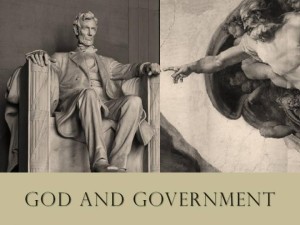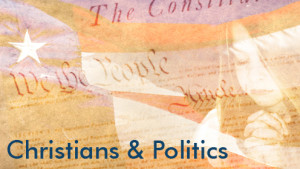I am a firm believer in the concept of the rule of law. Most of my students seem ignorant of the concept, so I try to explain that if we don’t follow the law, we become a society that is ruled by the whims of whoever happens to be in charge at the moment.
Yet I am also a firm believer that there are times when we must obey God rather than men. How, then, do I reconcile this?
 I take my students to Romans 13 (which I can do because I teach in an evangelical university) and offer them a lesson in the rules for the rule of law.
I take my students to Romans 13 (which I can do because I teach in an evangelical university) and offer them a lesson in the rules for the rule of law.
The first part of the chapter makes a strong statement about obeying government:
Let every person be in subjection to the governing authorities. For there is no authority except from God, and those which exist are established by God.
Therefore he who resists authority has opposed the ordinance of God; and they who have opposed will receive condemnation upon themselves.
At first glance, this might seem to say that government must be obeyed at all times, without exception. I’ll come back to that.
It also has been interpreted by some to say that every person who is in authority is a God-picked person—that whoever is ruling is the one God has chosen.
Be careful here. Do you really want to find a rationale that makes Lenin, Stalin, Hitler, and Mao God’s choices? Do you really want to say that all the millions they have murdered in the name of a godless ideology is what God wanted?
While there may be some who, in the light of their theology, are convinced that everything that happens is, in some mysterious way, God’s will, I am not one of that number.
While God may use evil rulers, they have chosen to be evil, and He does not approve of what they do. To believe otherwise would be to make God into someone who is in favor of sin. That is not the God of the Scriptures.
 What this Romans passage is saying, I think, is that God has established civil government and the positions in that government that people should obey, not every individual who holds one of those positions.
What this Romans passage is saying, I think, is that God has established civil government and the positions in that government that people should obey, not every individual who holds one of those positions.
So this first part of Romans 13 makes it clear that government is to be obeyed—the rule of law is the norm.
Yet this first part is only that—the first part. There is a greater context. The apostle Paul continues:
For rulers are not a cause of fear for good behavior, but for evil. Do you want to have no fear of authority? Do what is good, and you will have praise from the same; for it is a minister of God to you for good. But if you do what is evil, be afraid; for it does not bear the sword for nothing; for it is a minister of God, an avenger who brings wrath upon the one who practices evil.
Now we are given the mission of civil government: it is to be a minister of God, carrying out His will by punishing those who do evil. We are told that if we do good, we have nothing to fear from government.
That is true in normal circumstances. But what if the government is violating its God-given mission? What if a government is doing just the opposite of what God intended? What if it is, in effect, promoting evil and punishing those who do good?
Is that a government that is to be obeyed?
If we obey that kind of government, we have made this institution into “god.” We cannot do that. The government—i.e., those who are responsible for its actions—is also supposed to be under God, and it will be held accountable for what it has done that is contrary to His will.
Whenever civil government disobeys God, we are duty bound to resist that government action. When told to stop preaching in the name of Jesus, the apostles told the authorities that they had to obey God rather than man.
Let’s bring it up to our time.
When the government says it’s just fine to murder innocent children in the womb, are we to go along passively with this atrocity?
When the government says homosexuality is good and acceptable and then redefines marriage, are we to submit without a complaint?
In both of these cases, government has overstepped its boundaries and violated its God-given mission. We can use whatever legal means are available to us to challenge these decisions, and we can raise our voices in the public square to convince others to join with us to overturn unjust laws.
Any man-made law that conflicts with God’s eternal law in inherently invalid.
What about other types of laws with which we disagree? Must we always be quiet about them and simply obey?
 We have another recourse. Take Obamacare, for instance. There certainly is nothing in Scripture that tells us directly that this is an evil, sinful law. However, we do still have a Constitution, which is supposed to be the standard for our rule of law.
We have another recourse. Take Obamacare, for instance. There certainly is nothing in Scripture that tells us directly that this is an evil, sinful law. However, we do still have a Constitution, which is supposed to be the standard for our rule of law.
Any law, whether passed by Congress or decreed by the Supreme Court, that violates the authority given to the federal government in that Constitution is fair game for dissent on our part, and for public argument against it, alongside active measures that can be taken to overturn such a law.
So, as Christians, we have both God’s law and the Constitution as our guidelines for when we obey the government and when we do not.
I believe in the rule of law, but there are rules for when something is a legitimate law that we should obey. When a law is illegitimate, we have a Christian duty to do whatever we can—in the proper Christian spirit—to undo that law.
God’s law is paramount. Constitutional boundaries come next. We must always make those our priority.
